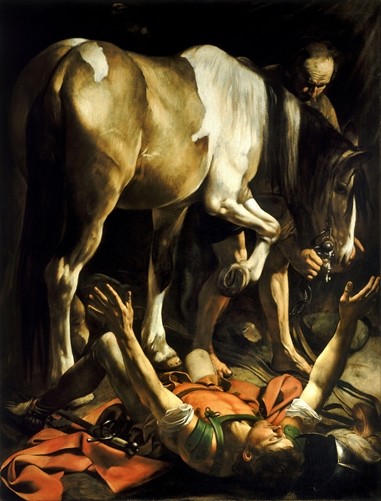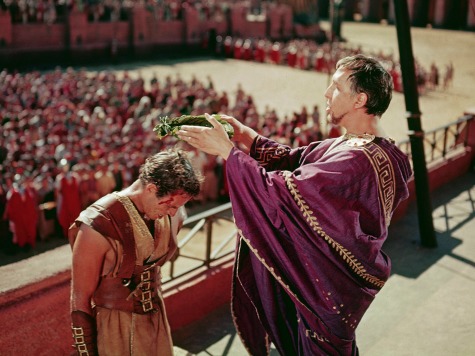There’s an old saw about standing on the shoulders of giants and thinking you’re tall. In other words, you take full advantage of what came before you while pretending, or even wrongly believing, that it sprang fully-formed from your own head or just materialized out of the ether.
As militant secularists try to scrub Christianity out of Western culture, they’re engaged in a fundamentally dishonest pursuit, which requires a great deal of rewriting and revising of history. They’re also actively turning their backs on, or only vaguely comprehending, huge chunks of art, music and literature inspired by biblical stories and themes, and by the lives of believers (or simply commissioned by the Church itself).
But they have succeeded in scrubbing it in certain areas, including many universities, among cultural elites and in most of the media (who are not fond of competition for their spot at the top of the style-setting hierarchy).
But this is a very recent development.
From medieval times well into the 20th Century, part of being considered educated in the West (often in universities, a concept that was fostered within the Catholic Church) meant to be grounded in the classical writings from Ancient Greece and Rome–which Catholic clergy and lay monastics preserved for posterity through the Fall of Rome and the Black Plague–and to be well-versed in the stories and characters of the Bible.
Whether people were believing Christians or not, this gave the Western world a common symbolic language, along with generally recognized idioms and literary references. But many educated people today are Biblically illiterate, which impairs their ability to decipher the intent and concepts of lots of art, music and literature.
If you’re listening to Handel’s “Messiah” without knowing whom the title or lyrics reference; or you’re looking at Michelangelo’s “Pieta” without knowing the full story of Christ’s Passion and death; or you watch Ingmar Bergman’s 1961 “Through a Glass Darkly” and just think the title is some weird thing he made up; or you’re wondering who this guy is, why he’s on the ground, and what’s up with the horse, in the Caravaggio painting below, you’re only getting a fragment of the meaning.

Of course, this cultural illiteracy has been exacerbated over the last two or three decades by the increasing secularization and Biblical ignorance–or even hostility–of those making TV and movies. If they do reference Christianity, it’s often erroneous, incomplete, intentionally misleading or just for window dressing (such as the rush to grab Catholic clergy and images when Satan and his minions are possessing a person or threatening to sweep over the face of the Earth).
Movies like 1956’s “The Ten Commandments” or 1959’s “Ben-Hur” might be big, overblown, scenery-chewing cheese-fests, but they took the faith–Judaism in the first, and Judaism and nascent Christianity in the second–at the core of their stories seriously (the same can’t quite be said of Darren Aronofsky’s eco-fantastical, Gnostic “Noah”).
Although it has plenty of sensationalist elements, William Peter Blatty’s 1973 “The Exorcist” is grounded in solid psychology and Catholic theology.
All the way up to “Jesus of Nazareth” on TV in 1977, directed by Italian Franco Zeffirelli, depictions of Christ could still be reverent and faithful to the source material, but since then, finding one or both of those qualities in most mainstream movies or TV shows has become a near-impossibility.
Frankly, if you don’t have a fair number of sincere, believing Christians who are influential writers, producers, directors, and film and TV executives (and the Hollywood climate is not welcoming to those that try to break in), the odds of having quality, accurate depictions of Biblical themes and stories becomes vanishingly small. Oh, they’ll get made from time to time, but they’ll mostly be schlock.
Or, they’ll focus on the Amish, who are featured in a surprising number of reality-TV shows, most of which either are about the will-they-or-won’t-they-stay Amish theme, a la “Breaking Amish,” or looking at the dark side of simplicity, or at least that’s what “Amish Mafia” purports to do. It’ll take a lot of faith for the Amish to survive being Hollywood’s new BFFs (Best Faith Friends).
Also, Hollywood long ago fell under the thrall of Christian, and especially Catholic, dissidents and skeptics, and began assuming they were the only ones with anything interesting to say.
So when Mel Gibson did an end run around Hollywood and produced the wildly successful “The Passion of the Christ” in 2004, official moviedom was stunned to find out there was money, and lots of it, to be made with a straight-up Jesus tale. But as Gibson is a problematic figure at best, this success wasn’t repeated.
Then came “The Bible” on History Channel in March 2013. Its timing couldn’t have been better, since it aired during Lent and ended on Easter, and Pope Francis was elected right in the middle of the run. While executive producer Roma Downey’s (“Touched by an Angel”) Catholic faith is well-known, much of America, and probably Hollywood, was surprised to learn that her husband, reality-show mogul Mark Burnett (“Survivor,” “The Voice”) was also a sincere and faithful Christian.
While not everybody was 100 percent happy with “The Bible”–or “Son of God,” the two-hour movie version edited from the New Testament portion, released in February–it did open up the full text of its source book to many people who only had a cursory familiarity with it.
Said Downey before “The Bible” premiered, “We started with the premise that the Bible is the truth. These are true stories, and it was our job to bring them to life on the screen. We’re not saying, ‘Maybe this happened,’ or ‘According to the Bible,’ we’re just telling the story as written.”
Now, Burnett is working on “A.D.: Beyond the Bible,” coming out in 2015, focusing on the early years of Christianity, only now it’s on NBC, a broadcast network.
Bible-based and Christian-focused stories are also picking up steam in other areas, but with the mixed reaction to “Noah”–despite star Russell Crowe’s unsuccessful efforts to enlist Pope Francis as a booster–filmmakers and TV producers looking to replicate the success of “The Bible” may be more thoughtful from now on.
MGM-Paramount recently announced a remake of “Ben-Hur,” based on Lew Wallace’s 1880 novel, “Ben-Hur: A Tale of the Christ,” set to be released on Feb. 26, 2016 (in the middle of Lent). The existing script–written by Keith Clarke with revisions by John Ridley (“12 Years a Slave”) is a prequel of sorts to the movie, focusing on the younger years of Jewish aristocrat Judah Ben-Hur and his childhood friend, Roman commander Messala.
Focusing on this period of time would allow the new “Ben-Hur” to sidestep the “Christ” part of the novel, since Jesus doesn’t enter the story until well into the 1959 film. So, this could be considered as Hollywood wanting to have its religious-movie-remake cake and eat it, too.
But, Downey and Burnett have now been signed on as co-producers, so we’ll see how that works out. Burnett is also working with CBS to develop a miniseries based on Alice Hoffman’s “The Dovekeepers,” which looks at four women who wind up with at the siege of Masada.
Meanwhile, female-skewing Lifetime has gained access behind the walls of a Catholic convent for the six-episode “The Sisterhood,” an upcoming unscripted series following five young women contemplating becoming Brides of Christ. For better or worse, the production company is Hot Snakes Media, which is responsible for “Return to Amish,” “Breaking the Faith” and “Breaking Amish.” Prayers should probably start now.
Also, Fox network has teamed with Landscape Entertainment, headed by Bob Cooper (“Amistad”)–who, as president of HBO Pictures, oversaw “Barbarians at the Gate,” “And the Band Played On,” “Stalin” and “The Burning Season”–to develop “Nazareth,” an event series based on the formative years of Jesus’ life. The write and executive producer is “Gladiator” writer David Franzoni, who also wrote “Amistad” and “King Arthur.”
For what it’s worth, a 2004 L.A. Times article says of Franzoni: “Lost legs–this is how Franzoni sees history. His characters, when they’re not busy being shackled in chains or declaiming on the rights of man, are usually dismembering each other. Franzoni believes that Arthur, for instance, was not a chivalrous medieval king but a tragic Roman mercenary with a weakness for humanist philosophy whose lot it was to be stuck in Britain while his empire fell around him. Assorted British cultural groups are objecting to the portrayal, as are some historians.”
As there is no historical documentation of Christ’s younger years–except for the story in the Gospel of Luke that finds Him at 12, when He goes missing from a family caravan after a trip to Jerusalem, to be found later by His worried parents preaching in the temple–one hesitates to contemplate what Franzoni might cook up. But Pope Emeritus Benedict XVI did write “Jesus of Nazareth: The Infancy Narratives,” so that’s available.
At some point, though, these productions may spark viewers’ curiosity and send them back to the Bible itself. Nothing would make Burnett happier.
“A lot of thought went into this; it’s not random,” he said about “The Bible.” “It’s not even a choice, is it? It’s a mandate. You have to honor the sacred text. Go read the book. It’s as clear as the writing on the wall. … God is moving.”

COMMENTS
Please let us know if you're having issues with commenting.